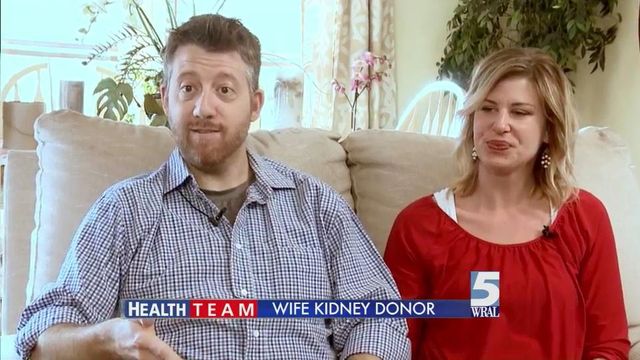Mother, son benefit from rare spousal kidney donations
When Jason Diacumski's kidneys failed, his wife stepped in to donate one of hers so he could live.
Posted — UpdatedThere are 93,000 people on the kidney transplant waiting list, according to the Living Kidney Donor Network.
People can wait 5 to 10 years for a deceased donor, while many hope to find a living donor to sacrifice one of their kidneys.
Jason and Nichole Diacumski pledged their love – through thick and thin – 15 years ago.
An inherited kidney disease would inspire a grand demonstration of that vow: Jason's mother had polycystic kidney disease, and 12 years ago, Jason learned he had it as well.
"My kidney function really began to fail in the last two years," Jason Diacumski said. "That's when I could really feel sick."
With PKD, cysts develop on the kidneys causing them to swell and ultimately fail. Jason Diacumski's mom needed a kidney donor, and her husband, Jason's step-father, qualified as a living donor.
Nichole Diacumski was convinced she could do the same for her husband at Duke University Hospital, where they both work as nurses.
"There were telling her, 'We need to test to make sure you're a match,'" Jason Diacumski said. "(She told them) 'No, I know I'm a match. I know I'm a match."
"I thought it was very exciting to think that maybe I would be able to give a kidney and save him, you know?" Nichole Diacumski said.
As fate would have it, the match was good.
Kidney transplant surgeon Dr. Deepak Vikraman says a spouse being a good donor match is highly unusual, but in this family it happened twice.
"My mom and I are really blessed to have married the perfect match," Jason Diacumski said.
The couple went into surgery on Feb. 29. Surgeons removed one healthy kidney from Nichole Discumski to give to her husband. In another room, they removed two cyst-covered kidneys from Jason.
"My kidneys were huge," Jason Diacumski said of his soccer-ball sized kidneys. "I don't even know how they made urine, they were so big."
After the transplant, three years of extreme fatigue and kidney dialysis ended.
"It's great," Jason Diacumski said. "I can't thank (my wife) enough. I constantly find myself saying 'Thank you, thank you.'"
"We call it the super kidney," Nichole Diacumski said.
She added: "And I still kind of refer to it as mine."
A living donor kidney lasts, on average, 15 to 20 years. So, eventually, Jason Diacumski might need another kidney donor.
Anyone can register to be an organ donor when they get or renew a driver's license. Registering helps doctors search for a deceased donor match.
The testing process for a living kidney donor takes about a full day and includes blood testing and other questions to tests a potential donor's willingness to actually donate if called upon.
Donors can live a full, normal life with just one kidney, while someone else lives longer because of that sacrifice.
• Credits
Copyright 2024 by Capitol Broadcasting Company. All rights reserved. This material may not be published, broadcast, rewritten or redistributed.





